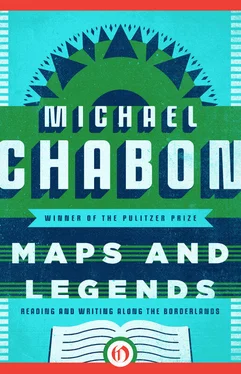Eventually I tacked the map, considerably tattered and worn, to the wall of my room, on the second floor of our three-bedroom, two-and-a-half-bath pseudocolonial tract house on Eliots Oak Road. In time the original map was joined, there, by a map of Walt Disney World’s new Magic Kingdom, and by another of a world of my own devising, a world of horses and tall grass which I called Davoria. I studied the map of Columbia in the morning as I dressed for school (a school without classrooms, in which we were taught, both by racially diverse teachers and by the experience of simply looking around at the other faces in the room, that the battle for integration and civil rights was over, and that the good guys had won). I glanced up at the map at night as I lay in bed, reading The Hobbit or The Book of Three or a novel set in Oz. And sometimes I would give it a once-over before I set out with my black and white friends for a foray into the hinterlands, to the borders of our town and our imaginations.
Our neighborhood of Longfellow was relatively complete, with fresh-rolled sod lawns and spindly little foal-legged trees, but just beyond its edges my friends and I could ride our bikes clear off the edge of the Known World, into that unexplored blank of bulldozed clay and ribboned stakes where, one day, houses and lives would blossom. We would climb down the lattices of rebar into newly dug basements, dank and clammy and furred with ends of tree roots. We rolled giant spools of telephone cable down earthen mounds, and collected as if they were arrowheads bent nails and spent missile shells of grout. The skeletons of houses, their nervous systems, their subcutaneous layers of insulation, were revealed to us as we watched them growing from the inside out. Later I might come to know the house’s eventual occupants, and visit them, and stand in their kitchen thinking, I saw your house being born.
In a sense, the ongoing work of my hometown and the business of my childhood coincided perfectly; for as my family subsequently moved to the even newer, rawer Village of Long Reach, and then proceeded to fall very rapidly apart, Columbia and I both struggled to fill in the empty places, to feel our way outward into the mysterious gaps and undiscovered corners of the world. In the course of my years in Columbia, I encountered things not called for by the members of the Working Group, things that were not on the map. There were strange, uncharted territories of race and sex and nagging human unhappiness. And there was the vast, unsuspected cataclysm of my parents’ divorce, which redrew so many boundaries, and created, with the proverbial stroke of the pen, vast new areas of confusion and dismay. And then one day I left Columbia and discovered the bitter truth about race relations, and for a while I was inclined to view the lessons I had been taught with a certain amount of rueful anger. I felt that I had been lied to, that the map I had been handed was a forgery. And after all, I would hear it said from time to time, Columbia had failed in its grand experiment. It had become a garden-variety suburb in the Baltimore-Washington Corridor; there was crime there, and racial unrest.
The judgments of Columbia’s critics may or may not be accurate, but it seems to me, looking back at the city of my and James Rouse’s dreams from thirty years, on, that just because you have stopped believing in something you once were promised does not mean that the promise itself was a lie. Childhood, at its best, is a perpetual adventure, in the truest sense of that overtaxed word: a setting-forth into trackless lands that might have come into existence the instant before you first laid eyes on them. How fortunate I was to be handed, at such an early age, a map to steer by, however provisional, a map furthermore ornamented with a complex nomenclature of allusions drawn from the poems, novels, and stories of mysterious men named Faulkner, Hemingway, Frost, Hawthorne, and Fitzgerald! Those names, that adventure, are still with me every time I sit down at the keyboard to sail off, clutching some dubious map or other, into terra incognita.
FAN FICTIONS: ON SHERLOCK HOLMES
1.
ONE HUNDRED AND TWENTY years after his first appearance in print, in the pages of Beeton’s Christmas Annual for 1887, fans and nonbelievers alike seem to feel compelled to try to explain Sherlock Holmes’s lasting appeal, marveling or shaking their heads at it, or both, as if the stories of the adventures with Dr. Watson were a system, like semaphore or the pneumatic post, that ought to have been superseded long since. Such explanations make the case, with varying success, for clever and competent plotting, or the bourgeois thirst for tidy adventure, or nostalgia for a vanished age (Victorian, or adolescent), or the Holmes-Watson dynamic (analyzed perhaps in terms of Jungian or queer theory), or the underlying and still-palpable gentlemanliness of Sir Arthur Conan Doyle, or even, of all things, for the quality of the writing itself, so much higher than it ever needed to be. Inherent in these explanations, buried or explicit, among apologists and critics alike, is a feeling that maybe the fifty-six stories and four short novels that make up the so-called canon (so-called by Sherlockians, about whom more later) are not worthy of such enduring admiration.
Like the flaw in the kabbalists’ universe, doubt about the literary merit of the Holmes stories has been present from the first, and the fault lies squarely with the Author. It would be foolish to argue that Conan Doyle despised his Holmes work; it is well known that he regretted it, and disparaged it, saying of Holmes, “I have had such an overdose of [Holmes] that I feel towards him as I do toward pâté de foie gras, of which I once ate too much, so that the name of it gives me a sickly feeling to this day.” In 1893, in “The Final Problem,” a story that reads very much like the act of a desperate man, he made a sincere attempt to have Holmes murdered (by Dr. Moriarty at Reichenbach Falls). But even the first Holmes story, A Study in Scarlet, suffers from the author’s lack of faith in his creation, since for most of its second part it wanders forlornly, sans Holmes or Watson, amid the Mormon wastes of Utah, where the assassin, later trapped by Holmes, loses the girl he loved.
The next Holmes adventure, The Sign of Four, opens with a chapter that features the first of many metacriticisms the detective would offer about the literary efforts of his companion and, by extension, of the cash-strapped young doctor who held their strings: “I glanced over it,” Holmes remarks to Watson, referring to A Study in Scarlet. He continues,
Honestly, I cannot congratulate you upon it. Detection is, or ought to be, an exact science, and should be treated in the same cold and unemotional manner. You have attempted to tinge it with romanticism, which produces much the same effect as if you worked a love-story or an elopement into the fifth proposition of Euclid.
Some of us feel, of course, that the fifth proposition of Euclid would only be improved by a nice juicy elopement. This is a typical bit of good-humored self-mockery, with Conan Doyle displaying the sly wit for which he is too rarely, even by his most ardent admirers, given credit.
While he was busy scorning the Holmes stories and planning Holmes’s death, and nursing the suppurating pride of a would-be Walter Scott condemned, first by necessity and then by success, to write popular fiction, Conan Doyle was also, from the beginning, tangibly having fun. It seems to have been characteristic of the man that, as in the above passage, he was usually having it at his own expense.
Like most writers, Conan Doyle wrote for money. His misfortune as an artist was to make piles of it, and become famous around the world, by writing stories he did not consider worthy of his talent, while receiving less credit or pay for works that meant more to him; and to be so freehanded in his philanthropy, wild schemes, and spending habits, and so well endowed with children, that the piles of money were never quite tall enough. Few writers wrote more determinedly for cash than Conan Doyle each time he surrendered his pen to the further elaboration of Sherlock Holmes. That the results of this arrant and effective hackwork have endured so long testifies, in my view, not only to Conan Doyle’s art and storytelling gift, and to the magic of the central heroic duo, but to the quickening force, neglected, derided, and denied, of money and the getting of it on a ready imagination.
Читать дальше
Конец ознакомительного отрывка
Купить книгу












